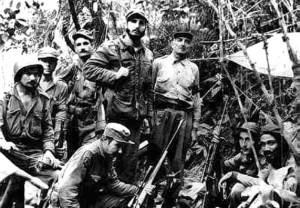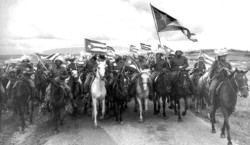International
"After Castro"
Flashback to 1989
Saul Landau
 |
| Young communists in Cuba: Socialism or death! |
Almost twenty years ago, filmmaker Saul Landau, who rode with Castro in the early years of the Cuban Revolution, returned to Cuba to see what progress the country had made. His report for Mother Jones, titled "After Castro," carried the judgment: "The revolution that Fidel fathered can only succeed without him." The following excerpts are as relevant today, on the eve of Castro's death, as they were then.
Fidel has pushed Cubans to take seven-league boot strides in some areas; in others, a thin veneer of modernity disguises a form of incompetence, based on values that predate and even vitiate scientific thought and disciplined economic production. He continues, after thirty years, to preside over both these Cubas, apparently unable to retire until he feels certain that the Revolution's new ways of thinking and acting have definitively conquered the old. But ironically, Cubans may not be able to break through the current crisis, both economic and political, with Fidel as Father, a role that prevents his people from achieving full political adulthood.
Thousands of new school buildings and apartments stand as testimony to the achievement of collective labour. Bad housing still exists, but no homelessness. The rural population has access to roads, which have replaced trails… A multilane freeway now covers much of the island. There are hundreds of clinics and hospitals and twenty-five thousand doctors (there were six thousand in 1959, half of whom fled to the United States). Fidel recently instituted a family doctor practice by placing a medical school graduate in each Cuban neighbourhood. Helicopters transport emergency patients from remote mountain villages to hospitals, and Cuban surgeons today regularly perform heart and other organ transplants. All Cuban kids go to school, most from day care through ninth grade or beyond, and the population has reasonable retirement programmes, job security, and other economic protection. Beyond the statistics, there is this one overriding fact: in thirty years, Cuba has been transformed from a fragment of the U.S. economy into a proud nation.
 |
| Fidel being questioned by Batista's police after Moncada in 1953. |
"Fidel is a magician in foreign policy," the filmmaker said… "but I think he cannot magically solve our internal problems by continuing to [try to] teach us the way to behave in almost every area of life."
Consider one example of Fidel's omnipresence: A few years ago I watched a televised talk as Fidel extolled the virtues of vegetables and offered detailed, imaginative ideas for cooking them without frying them, Cuban-style, in lard. Fidel described all the varieties of Cuban-grown plants, especially praising anti-carcinogenic broccoli and eggplant. This speech drew wide attention. Afterward, I overheard two hotel employees discussing his recipes. "The only thing he didn't tell us," one said, "was how to get the vegetables."
A year later, I stopped to film some one hundred people waiting in line to buy greens. At the front of the line sat two lethargic clerks torpidly punching sales codes on computerised cash registers after weighing the produce on balance scales. A woman shopper noticed the camera and shouted at me in Spanish: "Look at the crap we have to put up with." I asked her to repeat what she had said. "Are you with Cuban TV?" she asked. I told her I was a foreigner, and her expression changed. "Forget it. I wanted Fidel to see what we have to go through to get a few greens. For foreigners, no."
 |
Fidel and his comrades.
|
How ironic that seemed: Fidel, of course, already knows about the lines, the bad distribution, and the inefficient clerking. And if I had filmed the scene for Cuban TV, it wouldn't have aired. The woman's instinct was protectiveness an effort to avoid revealing the depth of Cuba's problems to outsiders.
After the 1961 Bay of Pigs and the 1962 Missile Crisis, CIA-supplied counterrevolutionaries operated in the Escambray Mountains through 1966. CIA-funded exiles raided coastal installations and burned cane fields, and those who were caught were often shot.
The political police also crushed internal dissent. The practices once used to counter U.S. attacks turned inwards, blotting out disagreements. The Party was purged twice of factions found disloyal to Fidel. Homosexuals and other deemed socially "unacceptable" were placed in labour camps without trials. Until the early 1980s, Cuban prisons still housed more than one thousand political prisoners. Fidel the consummate communist, the redeemer, the dreamer also knew how to crack down hard on his domestic enemies.
 |
| The beginning of the Cuban Revolution. |
Fidel trusts his old comrades, battle-tested and loyal for thirty or more years. The governing system that he created with local power centres, a national assembly, a council of state, plus the multi-tiered Communist Party organisation d, but he cannot claim his older brother's authority and legitimacy. Raul is a shy man, an unimpressive public speaker who has spent his post-revolutionary years as titular head behind Fidel of Cuba's military apparatus. There are those who worry that Fidel's passing would lead to more, not less, repression under Raul Castro.
is impressive on paper. But without his charisma to guide them, and indeed decide for them, no one knows whether or not they will function including Fidel. There is no Fidel II, nor even a reasonable facsimile, waiting in the wings. Fidel's younger brother by three years, Raul, minister of defence and number two behind Fidel, is respected and feared, but he cannot claim his older brother's authority and legitimacy. Raul is a shy man, an unimpressive public speaker who has spent his post-revolutionary years as titular head behind Fidel of Cuba's military apparatus. There are those who worry that Fidel's passing would lead to more, not less, repression under Raul Castro.
Though the first stage of revolution liberated creative energies and celebrated spontaneity, offered utopian dreams and historic fulfilment, the following stage added contrary elements: repression, faceless bureaucracy, and economic folly. Revolution was beautiful, counterrevolution ugly; and the poets, teachers, and engineers who led their classes in high school, showing revolutionary pluck and character, became those on whom it fell to defend the of creating a country where the best minds concentrated on planning, culture, and education, they instead fixed on the murky field of national security. Like any national-security bureaucracy, the Cuban state police with Fidel's blessing learned to maintain a crisis atmosphere, not an environment conducive to a socialist society with strong spiritual values.
Fidel, like Louis XIV, is the state. After visiting Cuba on a regular basis for more than thirty years, it seems clear to me that free discussion and sound development, including some Cuban form of political debate and economic restructuring, cannot take place when such power resides in one man with the apparent consent of the majority of Cubans. Fidel never tires of describing how the masses participate in defence, women's organisations, block committees, and so on. But participation without choice is a flawed political foundation.
This articles was first published in motherjones.com
Copyright (R) thedailystar.net 2007 |
